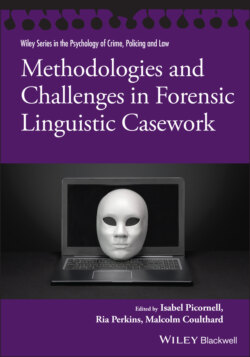Читать книгу Methodologies and Challenges in Forensic Linguistic Casework - Группа авторов - Страница 12
PURPOSE AND ORGANIZATION OF THIS BOOK
ОглавлениеThis book is aimed not only at students, academics, and professionals, but also at anyone interested in the interaction of language and the law and language as analysis for investigative purposes or evidence. Collectively, the chapters exemplify the state-of-the-art application of forensic linguistic analysis. The purpose is to illustrate the diversity of a field where forensic linguists may inform an investigation or a court-of-law and to examine how the professional quality of the linguist’s involvement, findings, and conclusions may be maintained.
Focusing on written (including electronic) communication, across a wide range of contexts, all chapters are authored by accomplished practitioners with consulting experience in their particular field. They discuss actual casework that they have undertaken, demonstrating their methodological choices and how they performed their analysis. The authors discuss and answer linguistic questions on issues as diverse as authorial ownership, communication in faked contexts, and how meaning is understood in today’s multisocial, multilingual society.
As discussed in more detail later in this chapter, this book sets out current “good practice” within the field of forensic linguistic casework. The choice of good practice rather than best practice is a conscious one to reflect the evolving nature of forensic linguistics, which is still a comparatively new field. Technological advances mean that the methodology, the data analyzed, and the contexts in which forensic linguists work are all constantly evolving. The book does not endorse any particular practitioners or promote any methodologies. Rather, it presents practices that demonstrate a high level of rigor and theoretical basis, that work well in the context in which they are applied, that have the potential for replication through their grounding in solid processes and methodologies, that are empirically supported by linguistic theory and research, and that are presented with consideration for their weaknesses and limitations.
The book is divided into two sections according to casework types: Section 1 deals with disputed and anonymous authorship analysis, while Section 2 addresses issues of meaning and interpretation.
